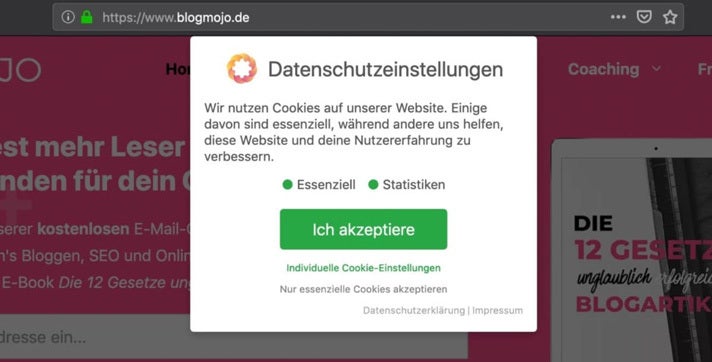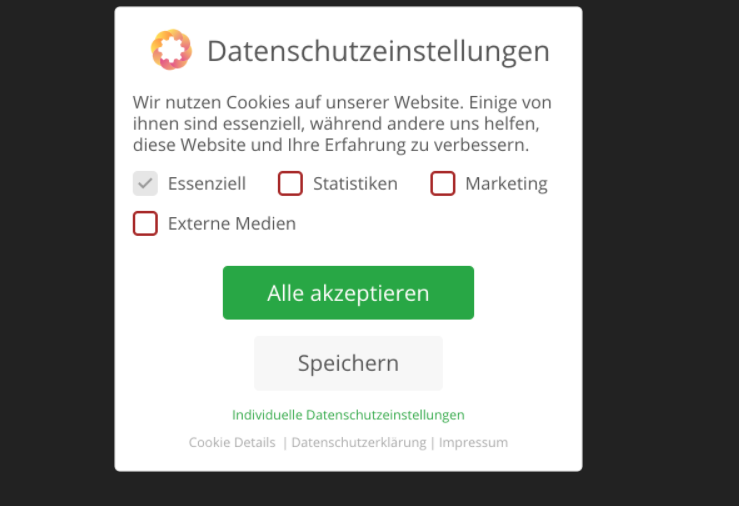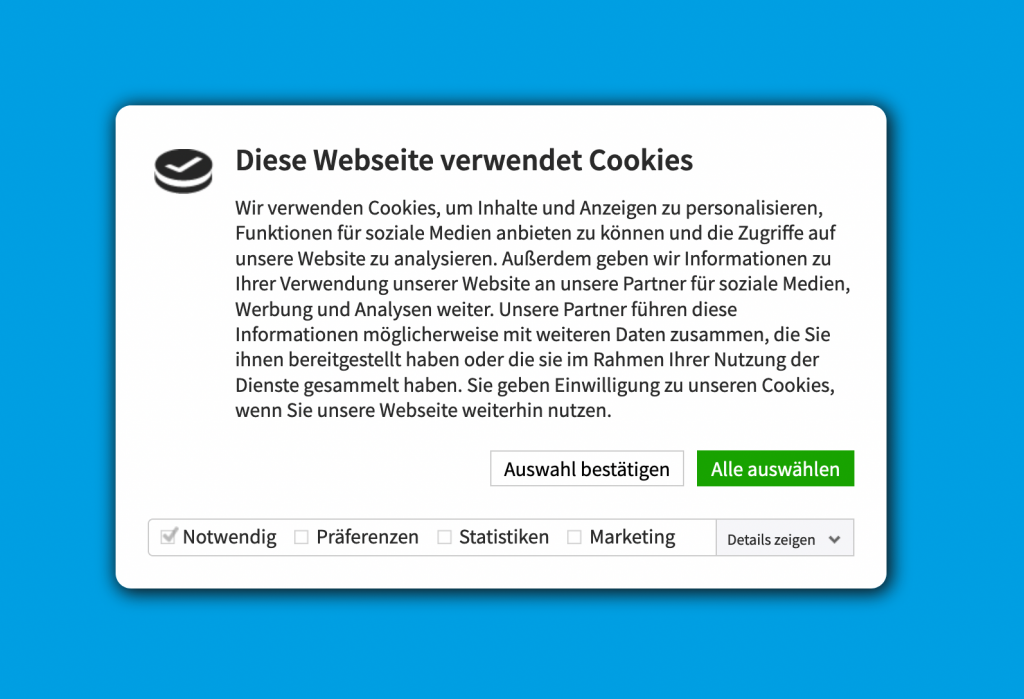Table of contents
- How to find out if your WordPress website uses cookies
- How to use a WordPress cookie plugin
- Does your website need a WordPress cookie banner with opt-in function?
- The 5 best WordPress cookie plugins
- Each WordPress website matches with a Cookie Plugin
You've probably heard about website cookies before. These data packets are created by almost every website to collect and store individual data about the surfing behavior of users. To make your WordPress website legally secure, you should definitely use a WordPress cookie plugin. According to the GDPR, as a website operator, you must inform about the processing of personal data - also with
WordPress!
A cookie plugin - also called cookie consent tool - can help you implement all necessary settings and displays. Therefore, we will discuss in this article how you can tell whether your WordPress website uses cookies and how you can use a WordPress cookie notice for your website. Afterwards, we will explain whether you need an opt-in banner for using cookies. We will also introduce you to the five best WordPress cookie plugins, so you can easily select and install the one that is best suited to you and your website.
Recommended Content-Management-Systems
On our comparison platform OMR Reviews, you can find more recommended content management systems. We present over 160 solutions that are specifically tailored to the needs of content management agencies, website operators and companies. This content management software offers comprehensive support in all aspects of website management. Take this opportunity to compare the different software solutions, drawing on authentic and verified user reviews:
Storyblok
Magnolia
Neos CMS
How to find out if your WordPress website uses cookies
As a rule, you will not be working with the standard-
WordPress theme but install another theme that better suits you and your content. Apart from the theme, WordPress websites also use a variety of plugins to make the user experience as individual and positive as possible. Themes and plugins you use, however, can use their own cookies. Please note that not all cookies are the same, as they differ in various types.
Types of website cookies are:
- Essential cookies: These are, for example, authentication cookies. With their help it is recognized whether a user is already logged in or still has to log in.
- Preference cookies: They store settings that have been individually determined by the users. Common examples are the username, language as well as the location and type of display of your website (mobile or desktop).
- Statistic cookies: They collect data on how users interact with your website. This data is often used to optimize the performance of your different website functions.
- Marketing and tracking cookies: You have probably often seen advertisements from websites you visited before. Marketing cookies are responsible for this. With these, the number of visitors and how often they clicked on a certain ad is also tracked. This allows the success of an ad campaign to be measured.
- Cookies set by third parties: Third-party cookies are set when using various applications that are intended to optimize the user experience on your website. This includes, for example, connecting your WordPress website with Instagram, Facebook, Twitter or YouTube.
Even
Google Analytics and WordPress use cookies. With WordPress, these are usually of a technical nature. When users leave a comment on your website, the
CMS system stores the name and e-mail address of the commenting person.
To check whether your WordPress website uses cookies, you should use a cookie scanner. This analyzes your website for plugins that use cookies and identifies them, so you can enter them in your plugin at the appropriate place. Such a scanner is integrated in various cookie plugins, which are presented later.
How to use a WordPress cookie plugin
To inform your website visitors about the use of cookies on your WordPress website, it's best to use a WordPress cookie plugin. In general, you can distinguish between three types of cookie banners that differ in the handling of the respective cookies.
1. Simple cookie notice
With a simple cookie notice, a simple banner is usually displayed at the top or bottom of the screen, informing your visitors that you use cookies on your WordPress website. As soon as the searchers click away the banner, the cookies are placed.

This is what a simple cookie notice might look like on your WordPress website
2. Cookie Opt-in
The cookie opt-in solution takes into account the current legal situation on data protection. Because only after the explicit consent of the website user the cookies are placed, which are used for advertising and market research purposes.

This is what your cookie opt-in could look like with the Borlabs Cookie plugin
3. Cookie Opt-out
The third option looks very similar to the opt-in button at first glance, but operates fundamentally differently from it. A cookie opt-out solution describes the process that cookies are set already during the loading of your website. By clicking on the 'Reject' button, your website visitors have the option to object to the previously set cookies. Note with this option that an opt-out does not provide legal security for dealing with non-essential cookies, as they are set without the explicit consent of the users.

This is what the cookie display in an opt-out solution might look like
Once you have decided on an option, you can set it up accordingly in the cookie plugin of your choice.
Does your website need a WordPress cookie banner with opt-in function?
Whether your website needs an opt-in cookie banner depends on the types of cookies you use. Since May 2020, the opt-in solution must be made available for all non-essential cookies. For these cookies to be set, your website visitors must take an active action, such as clicking on the 'Accept Cookies' button. Users must be able to inform themselves in advance about the use of the collected data. Cookies for which you need an opt-in include, for example, Google Analytics, the Facebook Pixel or cookies from advertising services such as
AdSense. For essential cookies, which are absolutely necessary for the functioning of your WordPress website, you do not need a cookie opt-in.
This applies, for example, to:
- Cookies for storing font size or language selection.
- Cookies for storing the user's login status.
- Cookies for storing the cookie settings.
- Shopping cart cookies in online shops.
- Cookies for implementing security measures.
- Cookies for load balancing (for distribution of server load).
In case of doubt, you should rather provide a cookie opt-in to be legally on the safe side.
The 5 best WordPress cookie plugins
Before we introduce you to the five best cookie plugins for
WordPress you should know,
what makes a good cookie plugin:
- Opt-in function
- Content blocker
- Ability to place links in the cookie banner (e.g. to your data protection declaration or to your site notice)
- Cookies can be deselected again after consent
- Logging of the cookie consent
- Display to the detail information directly in the cookie banner
1. Borlabs Cookie – WordPress cookie plugin
Let's start with the cookie plugin
Borlabs Cookie. This is one of the most popular WordPress cookie plugins in German-speaking countries. One of the reasons for this is the high degree of
individual customization and setting options, with which you can set up and visually adapt the cookie banner according to your needs. You can determine the colors, font and size as well as the display position and animations yourself. This way you can create an appealing opt-in box that asks the visitors of your
WordPress-Website for their consent.

What your cookie banner could look like with Borlabs Cookie
However, the customizer of the cookie banner does not have a live preview, so the result of the settings can always only be viewed after saving. Furthermore, you can easily import or export the granted consents into the plugin. Borlabs Cookie is compatible with most caching plugins and page builders, such as the Elementor page builder. If you want to include content from other websites like YouTube, Instagram or Google Maps, Borlabs Cookie allows you to do this with a simple two-click solution. You can view your opt-in statistics directly in the dashboard of the plugin in your WordPress backend. There you can also manage individual cookies or cookie groups.
The fact that your visitors can consent to the use of essential or individual cookies as well as separate cookie groups means that Borlabs Cookie meets all legal requirements, provided you have set up the plugin correctly beforehand. However, you have to enter the cookies used by your website or other plugins manually. After that, you can divide these into cookie groups, such as 'Essential', 'Marketing' and 'Statistics'. The users of your WordPress website can then give their consent by placing a checkmark at the different cookie groups.
The Borlabs Cookie plugin has a shortcode that allows you to block selected content initially, so that it only becomes available after the user's explicit consent. In this step, it first automatically replaces the content and presents the question for user consent instead. It also works with multilingual WordPress websites. However, the plugin settings and the used cookies must be managed separately for each offered language.
Due to its clear settings, the plugin can also be conveniently operated via mobile devices. In addition, Borlabs Cookie offers support for TCF 2.0 and recognises the use of bots and 'Do Not Track' headers. Shortcodes stored can easily change or revoke granted cookie consents. If you have any questions about this WordPress cookie plugin, a German-speaking support is at your side. Also, the fair price-performance ratio of 39 euros gross per year and website should not be overlooked.
Two small downsides of the plugin are, however, that you cannot distinguish between EU and third countries in the cookie query and cookies are not completely automatically removed if your users revoke their consent. In this case, you as the website operator must perform a few additional steps afterwards.
Here is a summary of all the advantages and disadvantages of the Borlabs Cookie plugin:
Borlabs Cookie advantages:
- Variety of individual setting and customization options
- Stylish design of the opt-in box
- Settings and consents can be easily imported and exported
- Two-click solution for embedded content
- Shortcode that loads selected content only after consent
- Compatible with most caching and page builder plugins
- Can be used on multilingual websites
- Clear plugin settings
- Support for TCF 2.0.
- Opt-in statistics visible
- Management of cookies and cookie groups
- German-speaking support
- Plugin recognises bots and 'Do Not Track' headers
- Shortcodes allow for changes or revocation of consents
- Fair price-performance ratio
- Cookie banner meets legal requirements with correct setup & maintenance
Borlabs Cookie disadvantages:
- Legal and technical expertise required for complete setup
- No distinction between EU and third country users
- Banner customizer without live preview
- Cookies must be entered manually
- For multilingual WordPress websites, settings and cookies must be managed separately
- Cookies are not completely automatically removed after revoking the consent
2. Cookiebot – WordPress cookie notice
The next cookie plugin we want to introduce is
Cookiebot by Usercentrics. It is easy to install and has the advantage that you don't have to
manually enter your cookies, because it scans them directly and
also sorts them into appropriate cookie groups. If a cookie cannot be assigned, you can manually add it to a category. Cookiebot
also supports TCF 2.0. and is compatible with a variety of
third-party tools.

The cookie banner provided by Cookiebot for your website could look like this all
Disadvantages of this WordPress cookie plugin are on the one hand the integration via an external script in WordPress, which does not guarantee complete data protection, and on the other hand the insufficient look and scope of the content blocker. The blocker blocks significantly fewer contents than for example Borlabs Cookie and instead of the blocked content only shows an ugly placeholder text, whose look you cannot adjust.
The costs for Cookiebot are based on the number of your websites: Up to a number of 100 WordPress websites Cookiebot is free, between 100 and 499 pages it costs 9 euros per month and between 500 and 4,999 pages Cookiebot costs 21 euros.
Here you can find all the advantages and disadvantages of Cookiebot summarized:
Cookiebot advantages:
- Easy installation.
- Up to 100 pages free.
- Support for TCF 2.0.
- Automatic cookie scan.
- Cookies are automatically divided into cookie groups.
- Compatible with many third-party tools.
- Content blocker available.
Cookiebot disadvantages:
- Use of an external script necessary to integrate into WordPress.
- No preview images for blocked content.
- Content blocker blocks few content.
- Comparatively expensive in use.
3. OneTrust – WordPress Cookie Plugin
OneTrust is a highly developed cookie-consent management tool that is specifically designed for integration into WordPress and other web platforms. It enables website owners to efficiently meet requirements of various privacy legislations like GDPR, ePrivacy and CCPA. OneTrust is distinguished by its ability to automatically scan the website and identify all existing cookies. Users can then grant their consent for various types of cookies through a customizable consent banner. The tool also offers a comprehensive solution for privacy management, as it not only assists in cookie management but also in processing user data and documenting the consents. Its strengths lie in the extensive customization options, the user-friendly interface and the comprehensive compliance with privacy regulations.
Advantages of OneTrust
Comprehensive Cookie Management: Automated scanning and classifying of cookies.
Data Privacy Compliance: Supports compliance with GDPR, ePrivacy and CCPA.
Customizable Consent Banner: Flexible design that can be adapted to the website layout.
Advanced Privacy Features: Offers additional tools for comprehensive privacy management.
Detailed reporting: Provides insights into cookie usage and user preferences.
Multilingual Options: Support for multiple languages for global application.
Easy integration: Integrates seamlessly into WordPress and other CMS.
Disadvantages of OneTrust
Cost Factor: Higher costs for advanced features and larger websites.
Learning Curve: Due to the complexity of the tool, a learning curve is required.
Performance Impact: Can slightly increase website loading times.
Complex Configuration: Requires careful configuration to achieve optimal results.
Information on the
prices of OneTrust (incl. user reviews with price reference) and
alternatives to OneTrust can be found on OMR Reviews.
4. Osano – WordPress Cookie Plugin
Osano is an advanced cookie consent management plugin specifically developed for WordPress websites. It's a comprehensive solution aimed at simplifying and ensuring compliance with various privacy standards such as GDPR, ePrivacy and CCPA. Osano stands out for its automatic detection and categorization of cookies, helping webmasters operate transparently and in conformity with privacy laws. The tool offers a user-friendly interface where users can give their consent to various cookie types. A standout feature of Osano is its easy implementation and ability to make privacy regulations comprehensible and accessible for users. It is especially suited for smaller to medium-sized websites in need of a reliable, yet easy to handle solution for cookie consent management.
Osano Advantages
Automatic Cookie Recognition: Identifies and categorizes cookies automatically.
Privacy Compliance: Promotes compliance with GDPR, ePrivacy and CCPA.
User-friendly Consent Options: Simple and clear consent options for visitors.
Easy Setup and Operation: Particularly suitable for smaller and medium-sized websites.
Free Basic Version Available: Offers a free basic version with basic features.
Customizable Banners: Design options for the consent banner to adapt to the website design.
Privacy Dashboard: Clear dashboard for managing user consent and cookies.
Osano Disadvantages
Limited Features in the Free Version: Advanced features are only available in the paid version.
Less Suitable for Very Large Websites: For extensive web presence, the tool might be limited.
Restricted Customization Options: Less flexibility compared to other tools in customizing the user interface.
Performance Impact: Like most plugins, Osano might also slightly affect the loading time of the website.
5. ConsentManager – WordPress Cookie Plugin
consentmanager is a powerful WordPress cookie consent plugin aimed at simplifying and ensuring compliance to privacy regulations like GDPR, ePrivacy directive and CCPA. This tool offers website operators a steadfast solution in gathering and managing consent for usage of cookies and other tracking technologies from their site visitors. ConsentManager teems with a user-friendly interface plus flexibility to customize consent banners according to the design of the website. In addition, it provides detailed reports and analyses on cookie usage aiding website operators in staying data-protection compliant while obtaining valuable insights into their visitor behavior. ConsentManager is particularly suitable for medium to large websites looking for a sturdy and customizable solution for their cookie consent management.
Advantages of ConsentManager
- Data Privacy Compliance: supports conformity to laws like GDPR and CCPA.
- Flexible Customization: allows consent banner to be customized to the website’s design.
- User-friendly Interface: simplifies management of user consent.
- Detailed Reports: offers thorough insights into cookie usage and user preferences.
- Comprehensive Functionalities: well suited for medium to large websites with complex requirements.
- Automatic Cookie Recognition: identifies and categorizes cookies for easier management.
- Multilingual Support: available in multi-languages proving benefit to global websites.
ConsentManager Disadvantages
- Cost Factor: for complete features, a paid license is needed.
- Learning Effort: can be slightly complex and overwhelming for beginners.
- Performance Influence: added strain on website performance from the plugin.
- Configuration Effort: requires careful set up in order to achieve optimal results.
Information about the
prices of ConsentManager (incl. user reviews with price reference) and
alternatives to ConsentManager can be found on OMR Reviews.
Each WordPress website matches with a Cookie Plugin
Every WordPress website and its plugins use cookies and there are a multitude of cookie plugins for this. Which one is the right one for you depends on the needs of your website, your customization wishes and your demands on the experience for your website visitors. Make sure to choose the correct type of cookie consent and thus put your WordPress website on legally safe digital feet. Plugins like Borlabs Cookie or
Real Cookie Banner are a bit more time-consuming to set up, but they offer a greater range of functions.
If you prefer a setup assistant, you should consider using Complianz. But also Cookiebot™ by Usercentrics and
DSGVO Pixelmate can offer you advantages. Take your time and compare the presented WordPress cookie plugins with each other and put your own requirements against them. Then, after their consent to the set cookies, you can offer your website users GDPR-compliant surfing fun that not only satisfies them, but you as well.
On
OMR Reviews you can find more WordPress cookie plugins in the
CMP category with real user reviews and user experiences.











